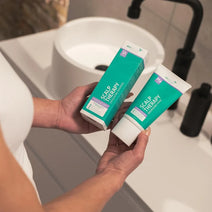What to do about seborrheic dermatitis
Seborrhoeic dermatitis and the scalp
Seborrheic dermatitis usually develops at the beginning of puberty and is not contagious. The eczema occurs because the skin fat, or sebum, changes. When this sebum changes, the yeast cells on the skin are likely to grow faster. Everyone has yeast cells on the skin. But if there are many, they can cause inflammation of the skin. The course of seborrheic eczema is variable, alternating quiet periods with times when it is more active.
Causes and prevention
It is not known exactly what causes seborrhoeic eczema. However, it is known that the yeast Malassezia furfur plays an important role. This yeast is found on the skin in many people, but it causes an inflammatory reaction in some. Other causes may include:
- Stress
- Genes
- Specified medical conditions and medications
- Cold, dry weather
- An immune system response
Not only can stress and cold be a cause, it can also make dermatitis worse. So it is important to be mindful of these causes and counteract them whenever possible, so at least you don't make it worse. It is also common in babies. About 70% of all newborns can suffer from it.
It is important to note that seborrhoeic dermatitis is not caused by allergies or poor hygiene.
Seborrheic dermatitis and hair loss
Seborrheic eczema is generally a chronic condition. You will always have to monitor and treat it. As indicated earlier, it can flare up in periods. If it persists for a long time, it can also have a negative effect on scalp health. It is herein where hair loss is associated with seborrheic eczema. Increased oil production causes irritation and inflammation of the scalp, leading to severe itching. Scratching the skin can damage hair follicles, hindering natural hair growth and leading to hair loss.
Learn more about it here: Scalp condition impacts hair growth and retention via oxidative stress
Advice personalized to your hair needs
Take our Hairtest to find the best products for your hair within 2 minutes!
The right remedies for seborrheic eczema
Happily, there are plenty of ways to tackle the flaking and itching caused by seborrheic eczema. The most well-known drug that works well against it is called ketoconazole. This is an antifungal drug with a proven effect against dandruff and fungi. It does mention mild side effects when using this drug in shampoos. In some cases, people experience skin complaints such as itching, burning, redness and flaking. It is also not wise to discontinue treatment abruptly. This again causes irritation because the skin has become accustomed to the drug. Another option is called Piroctone olamine. It has a similar action to ketoconazole and is also known under the brand name 'Octopirox'.
Read more about the action of Piroctone olamine compared to ketoconazole here.
In addition to the above remedies, corticosteroids are often recommended for treating various scalp problems due to their anti-inflammatory properties. While corticosteroids can be effective in treating various scalp problems, it is important to use them properly and under the supervision of a doctor. This is because prolonged or excessive use of corticosteroids can lead to serious side effects, such as thinning of the skin.
Effective treatments for scalp problems
Neofollics shampoo is a shampoo that contains Piroctone olamine and also promotes hair growth. Besides 12 hair growth-stimulating ingredients, this shampoo also tackles scalp problems such as seborrhoeic eczema. It soothes the scalp, is effective against dandruff and lays the foundation for healthy hair growth.
The Scalp Therapy package from Neofollics offers relief to various scalp conditions, including seborrheic eczema, psoriasis, dandruff, flaking and irritated scalp. This package includes an Exfoliating Shampoo, a Nourishing Mask and a Peeling Serum.
Do you only suffer from itching? Then using the shampoo is enough. The Exfoliating Shampoo is clinically proven to bring relief due to its high concentration of active ingredients.
Any doubts about the severity of your scalp disorder? Please feel free to contact our customer service team. If we cannot work it out together, then we will refer you to your GP.
For a combination of itch and dandruff, without severe scalp problems, we recommend adding the mask to your treatment in addition to the shampoo.
What results can you expect?
The Scalp Therapy products can be used as a course of treatment, often achieving the desired results within 3-4 weeks. After this initial period, you can switch to a maintenance dose. For example, instead of using all products several times a week, you can use only the Exfoliating Shampoo once a week to maintain the good condition of your scalp. If the scalp problems have disappeared after the cure and using the maintenance dose, they usually stay away. If the problems do return, you can consider another course of treatment. In fact, the products can be used for a long time due to the mild ingredients.

















